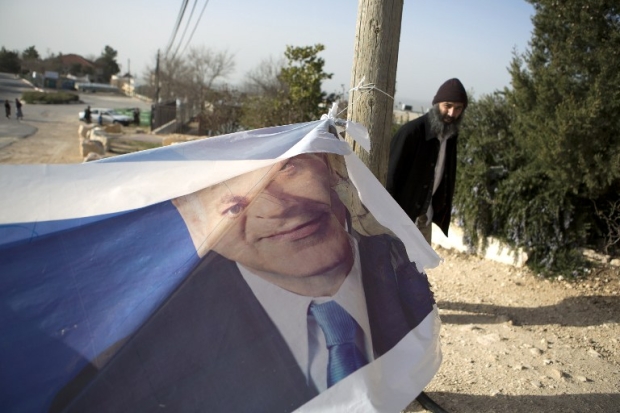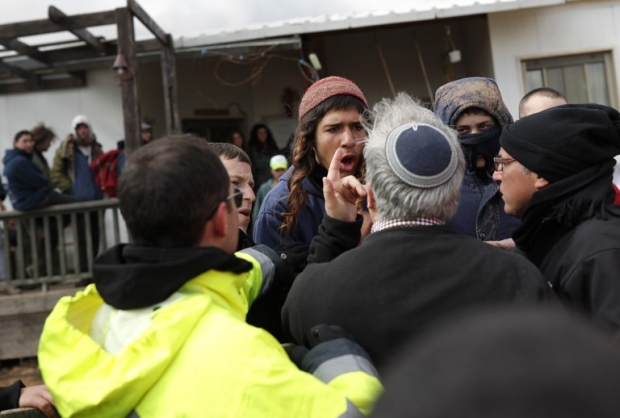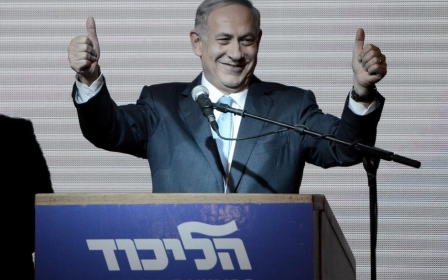Israel's settlement law: From occupation to annexation

On March 2012, Yaakov Kats, one of the extremists of the already extreme-right "National Unity" party, had a simple idea.
In order to solve the problem of settlements and outposts that had been built on private Palestinian land in the West Bank without official Israeli authorisation, a law should be enacted that would allow Israel to confiscate these lands from their owners.
The history of this legislation tells the story of the changing political map of Israel: how ideas which only a few years ago seemed radical have now moved into the mainstream
In short, a law for legalising theft.
In its early stages, Prime Minister Benjamin Netanyahu blocked this initiative, which was perceived to be a flagrant violation of Israel's self-declared commitment to international law.
Five years later, Katz is no longer a member of the Knesset and his party no longer exists, yet his law has lived on.
With Netanyahu's blessing - the same prime minister who botched it before - Katz's confiscation law passed with a comfortable majority in the Israeli parliament early this week.
Even if the Israeli High Court invalidates this confiscation law – euphemistically called "normalisation" law – the history of the legislation tells the story of the changing political map of Israel: how ideas which only a few years ago seemed radical and fringe have now moved into the mainstream.
Something old, something new
Confiscation of private Palestinian lands is, of course, not new in Israeli history. Right after the 1948 war, some four million dunams belonging to Palestinians who fled or were deported during the war were confiscated by the notorious absentee law.
One-third of the Palestinian areas in East Jerusalem annexed after the 1967 war were confiscated for the sake of building Israeli-only neighbourhoods.
READ: Palestinians demand action over Israeli land-grab law
Almost all of the settlements in the West Bank have been built on 90,000 hectares of land that Israel declared unilaterally as “state lands”.
The newly adopted "confiscation law" may therefore seem to be a minor evolution of this problematic tradition. Yet such a point of view misses the major political changes which have taken place in Israel in the past few years.
The political mood in Israel is moving definitively towards annexation of parts of the West Bank or even a full blown annexation
Since the 1967 war, Israel insisted on its ambiguous attitude towards the areas it occupies in the West Bank and Gaza.
On the one hand, it declined to annex the West Bank and Gaza, “voluntarily” applying the Fourth Geneva Convention which guarantees the protection of civilian populations under occupation. In innumerous cases in which Palestinians appealed to Israeli courts, they were allegedly treated according to this convention.
Yet at the same time, Israel refused to acknowledge that the West Bank and Gaza were occupied areas in the strict meaning of the term. This allowed it to settle hundreds of thousands of its citizens in the occupied territories, a move strictly forbidden according to the same Geneva Convention.
This ambiguity served Israel on the international level, allowing it to pretend that its control over the West Bank was open to negotiation and even portraying the settlements as temporary.
But it was even more important on the home front: it saved consecutive Israeli governments from the hard choice between annexing the West Bank and its 2.5 million Palestinians or withdrawing back to the 1967 borders.
Turning ambiguity against itself
Human rights organisations in Israel, such as Peace Now, Yesh Din and others, have tried to use this ambiguity in their favour.
As the Geneva Convention clearly and unconditionally forbids the confiscation of private property from civilians under occupation, they appealed in the name of Palestinian owners whose legally registered lands were used to build settlements.
In recent years, some of these appeals were successful and settlers were evicted from private Palestinian lands and their houses were demolished.
READ: How Israeli settlements won their best ever deal from Netanyahu
The most recent and perhaps biggest success was in Amona, an illegal outpost built on private lands of the village of Silwad near Ramallah. After lengthy deliberations and delays, Israel's High Court ordered the demolition of 40 houses built there and the return of the lands to their owners. The ruling was put into action last week.
‘We are not ashamed anymore’
But while these appeals and deliberations went on, the political map in Israel changed. The settlers, mainly represented by the Jewish Home party of Naftali Bennet, but also by Netanyahu’s ruling Likud party, gained more and more political power. Bennet's slogan in the last 2016 elections was “we are not ashamed anymore”.
Bennet's message was clear: we, the settlers, are not ready to put up with 50 years of ambiguity concerning the future of the West Bank. These areas belong to the Jews, and only to the Jews, and therefore the Jews cannot be considered occupiers “in their own lands”. The idea of an independent Palestinian state in these areas should be abandoned forever.
Naftali Bennet's message was clear: we, the settlers, are not ready to put up with 50 years of ambiguity concerning the future of the West Bank
Bennet did not do very well in the 2016 elections, but in the new government formed by Netanyahu, he gained an even bigger role than before. The education ministry went to him and the even more important justice ministry went to his fellow party member Ayelet Shaked.
With the help of settlement-sympathising ministers in the Likud, the pressure to abandon the ambiguity towards the West Bank and go for some sort of annexation steadily grew.
Up until Donald Trump's election, Netanyahu chose not to choose. He failed to take up any serious negotiations with the Palestinians, but he also refrained from changing the status quo.
The Amona circus
Yet now, things are changing. Whether it is because Netanyahu sees Trump as his saviour or whether the mounting corruption investigations against him are having an effect, it is evident that Netanyahu is losing his long time cautious approach.
The vote in the Knesset in favour of the confiscation law is a clear indication of this new direction. After the final ruling of the High Court, there was nothing that Netanyahu or Bennet could do that would have saved Amona from eviction. Even the settlers who illegally inhabited this outpost were aware of that. So its evacuation last week became a big show.
The evacuation of Amona was meant to be portrayed as the last one. Just a few days later, the passing of the confiscation law, allowing the government to confiscate private Palestinian lands on which settlements were already built was unequivocal in its pronouncement.
The political mood in Israel is moving definitively towards annexation of parts of the West Bank or even a full blown annexation. The Palestinians, according to the scenarios put forward by right-wing politicians, will have to settle for a downsized autonomy or to live as second-class residents in areas ruled directly by Israel.
Yet it is not entirely clear that we will reach full annexation anytime soon. Netanyahu is still putting on the brakes. He may understand the consequences of Israel being literally or even officially declared as an apartheid state.
But tempted by Trump or cornered by the galloping settler movement and by the criminal investigations against him, he may change course. Israel's ambiguous occupation may turn into an unambiguous annexation.
- Meron Rapoport is an Israeli journalist and writer, winner of the Napoli International Prize for Journalism for an inquiry about the stealing of olive trees from their Palestinian owners. He is ex-head of the news department at Haaretz, and now an independent journalist.
The views expressed in this article belong to the author and do not necessarily reflect the editorial policy of Middle East Eye.
Photo: An Israeli soldier removes a Palestinian flag previously placed by a peace activist at the Jewish wildcat outpost of Yad Yair, during a protest against the expansion of Jewish settlements in the West Bank on 24 April 2008 (AFP)
This article is available in French on Middle East Eye French edition.
Middle East Eye propose une couverture et une analyse indépendantes et incomparables du Moyen-Orient, de l’Afrique du Nord et d’autres régions du monde. Pour en savoir plus sur la reprise de ce contenu et les frais qui s’appliquent, veuillez remplir ce formulaire [en anglais]. Pour en savoir plus sur MEE, cliquez ici [en anglais].







